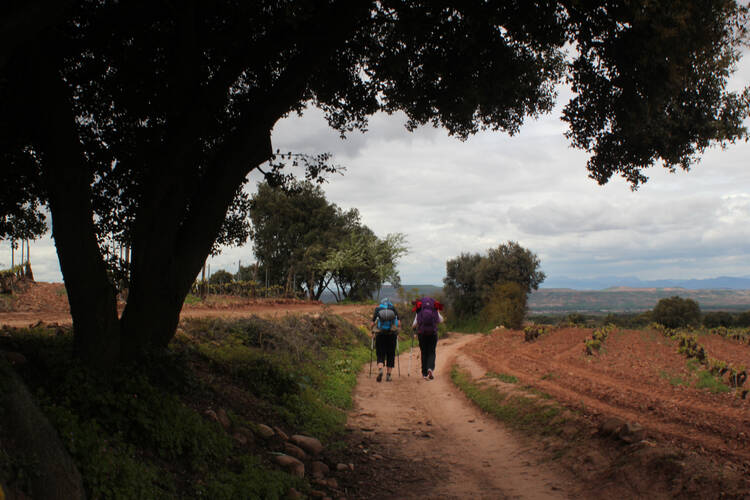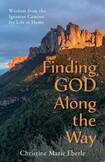Review: Recognizing our lives as pilgrimages
As Christine Marie Eberle details her experiences leading up to and eventually walking the Camino Ignaciano with the Ignatian Volunteer Corps in Finding God Along the Way, she masterfully weaves together Scripture, poetry and Ignatian spirituality. Eberle’s new book is an accessible, uplifting read for anyone who sees their faith as a journey. Her deep connection with, and awareness of, her humanity makes this book relatable to the reader, regardless of whether they have undertaken a pilgrimage like the one to which she is called. Her book is an invitation to us all to recognize our own lives as pilgrimages toward God.
From the beginning, Finding God Along the Way itself is like any journey. You don’t have to be a pilgrim on the Camino Ignaciano to understand the very human anxieties Eberle describes. Before heading to Spain from the United States, Eberle worries about details on behalf of her group, painstakingly considering things like how many nights in a hotel the group will need before they meet up with their host—yet she doesn’t manage to find hiking shoes that would prevent the blisters that eventually plague her journey. The feelings of frustration at preparing for the wrong things are recognizable to anyone who has set out on a big endeavor thinking they have it all planned out—and then painfully realized that planning didn’t pan out quite right.
The concept of pilgrimage has long fascinated me. While in graduate school for theology in 2011, I received a grant that allowed me to spend a summer visiting Ignatian sites in Spain, including Loyola, Montserrat and Manresa, before walking the Camino de Santiago. Even though Eberle and I were in different life spaces—I was in my 20s, working as a graduate assistant in Berkeley, nose piercing and hippie skirt my normal attire, while she was heading into what she refers to as the autumn of her life after a fruitful career in campus ministry—so much of what she experienced mirrored my own memories of the Camino. In fact, we even stayed at the same hostel in a town where the Camino Ignaciano crosses the Camino de Santiago.
While Eberle was part of a group, I undertook my pilgrimage alone. Eberle astutely claims, “We really never know what others are carrying.” Before I set out from Roncesvalles on my own trip, I worried that I would find myself feeling lonely, but instead I found myself in a community unlike any other. It turns out that walking for hours on end each day allows for a lot of space for conversations! One day, I learned about the untimely death of my new companion’s mother; on another, I heard about the loss of a job and general direction in a fellow pilgrim’s life.
Some days included intense conversations about faith and religion, while others were full of lighthearted laughter after a hearty lunch with plenty of Spanish wine. I myself was trying to sort out how I had found myself in theology school in a faith tradition that often left me disappointed. With seemingly endless hours of walking each day and very few distractions, pilgrims opened up to one another and shared our stories, allowing ourselves to go beneath the surface and share the burdens that others were carrying. Eberle’s pilgrim community was no different, and her group benefited greatly from prayer suggestions from their host, Father José, and regular Masses and reflections together.
Eberle learned in her experience that pilgrimage strips all of the superfluous things in our life away. Even though she brought more than she needed in her suitcase, the Camino helped Eberle to challenge herself to let go of those things both internally and externally that just don’t matter. The bigger challenge, though, was to consider how to transfer this type of detachment to daily life after the Camino Ignaciano.
Just as St. Ignatius offered his sword to Our Lady of Montserrat centuries before, Father José encouraged Eberle’s group to offer a symbol of their conversion during their vigil in Montserrat near the end of their pilgrimage. The members of Eberle’s group each left something before Our Lady, much like pilgrims on the Camino de Santiago do at the Cruz de Ferro, which is the highest point on the Camino Francés. Even the least religious people I met on the Camino looked forward to the moment in which they could leave the stone (or, in my case, a shell from the Pacific Ocean) they had carried from home, symbolic of something that they needed to release.
While I enjoyed reminiscing about my own Camino as I read, what made this book especially life-giving for me at this point in my life is that Eberle pushes the reader to slow down and pay attention in attainable ways. Eberle admits she is the kind of person who is always on the go, regularly taking on more projects, even when she tells herself she is going to do otherwise. She writes, “I’d always considered myself a multitasker, pridefully cramming efficient action into every nook and cranny of my calendar.”
Like the author, I have always prided myself on being a multi-tasker who can handle it all. As a mother of two active young girls, a wife, a Catholic high school administrator and a graduate student again, I find that getting myself to slow down is no easy task. Yet I forced myself to stop at the end of each chapter of Finding God Along the Way to sit with the questions posed. What would it look like if I allowed myself even just a few minutes each day to slow down and pay attention to where God might be showing up? It turns out that it makes a great deal of difference.
Ultimately, Eberle calls us to notice the small moments of grace all around us through her reflections on her Camino. My tween nephew playing a game with my preschool daughter, both of them belly laughing. The elderly woman complimenting my daughters’ eccentric clothing after an especially fidgety Sunday Mass. Neighbors from Hindu, Christian and atheist backgrounds enthusiastically introducing each other’s holidays and celebrations to one another’s children. If I hadn’t read this book in the midst of this busy season of my life, I might have missed these grace-filled moments. I’m grateful I took the time to pause. As Eberle reminds us: “There is power in the pause. Whether for a moment or an hour, a day or a week, a well-timed pause can reconnect us to ourselves, giving us fresh energy and perspective.” Finding God Along the Way gave me the encouragement to do just this.











